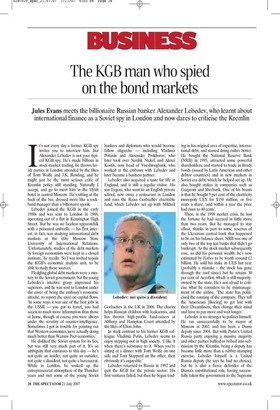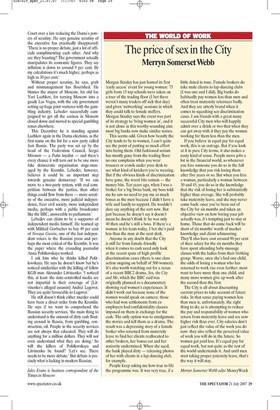The KGB man who spied on the bond markets
Jules Evans meets the billionaire Russian banker Alexander Lebedev, who learnt about international finance as a Soviet spy in London and now dares to criticise the Kremlin 1 t's not every day a former KGB spy invites you to interview him But Alexander Lebedev is not your typical KGB spy. He's made billions in stock-market trading, he throws lavish parties in London attended by the likes of Tom Wolfe and J.K. Rowling, and he might just be the most serious critic of Kremlin policy still standing. Naturally I accept, and go to meet him in the Hyatt hotel in central Moscow. He's sitting at the back of the bar, dressed more like a rockband manager than a billionaire spook.
Lebedev joined the KGB in the early 1980s and was sent to London in 1988, operating out of a flat in Kensington High Street. But he was no faceless apparatchik with a poisoned umbrella — his first interest, in fact, was studying international debt markets at the elite Moscow State University of International Relations. 'Unfortunately, studies of the debt markets by foreign economists were kept in a closed institute,' he recalls. 'So I was invited to join the KGB's economic analysis unit, to be able to study these sources.'
Fledgling global debt markets were a mystery to the Soviet government, but the young Lebedev's intuitive grasp impressed his superiors, and he was sent to London under the cover of being the embassy's economic attaché, to report (he says) on capital flows. 'In some ways it was one of the best jobs in the USSR — you got to travel, you had access to much more information than those at home, though of course you were always under the scrutiny of counter-intelligence. Sometimes I got in trouble for pointing out that Western economies were actually doing much better than Warsaw Pact economies.'
He disliked the Soviet system for its lies, but was still very much part of it. It's an ambiguity that continues to this day — he's not quite an insider, not quite an outsider, not quite a dissident, not quite a bureaucrat. While in London, he soaked up the entrepreneurial atmosphere of the Thatcher years and met some of the young Soviet bankers and diplomats who would become fellow oligarchs — including Vladimir Potanin and Alexander Prokhorov, who later took over Norilsk Nickel, and Alexei Kostin, now head of Vneshtorgbank, who worked at the embassy with Lebedev and later became a business partner.
Lebedev also acquired a taste for life in England, and is still a regular visitor. His son Evgeni, who went to an English private school, now owns a restaurant in London and runs the Raisa Gorbachev charitable fund, which Lebedev set up with Mikhail Gorbachev in the UK in 2006. The charity helps Russian children with leukaemia, and has thrown high-profile fund-raisers at Althorp and Hampton Court attended by the likes of Elton John.
In stark contrast to his former KGB colleague Vladimir Putin, Lebedev seems to enjoy stepping out in high society. 'I like it when there's substance to it. When you're sitting at a dinner with Tom Wolfe on one side and Tom Stoppard on the other, then obviously it's enjoyable.'
Lebedev returned to Russia in 1992 and quit the KGB for the private sector. His first ventures failed, but then he began trading in his original area of expertise, international debt, and started doing rather better. He bought the National Reserve Bank (NRB) in 1995, attracted some powerful shareholders, and started to trade in Brady bonds (issued by Latin American and other debtor countries) and in new markets in Soviet-era debt, which he helped set up. He also bought stakes in companies such as Gazprom and Sberbank. One of his boasts is that he bought 9 per cent of the electricity monopoly UES for $350 million, or five cents a share, 'and within a year the price had risen to 40 cents'.
Then, in the 1998 market crisis, he lost the fortune he had accrued in little more than two years. But he managed to stay afloat, thanks in part to some reserves of the Ukrainian central bank that happened to be on his balance sheet. NRB was one of only two of the top ten banks that didn't go bankrupt. As the stock market subsequently rose, so did his personal wealth: he's now estimated by Forbes to be worth around £2 billion. He sold his stake in UES last year (probably a mistake – the stock has gone through the roof since) but he retains 30 per cent of Aeroflot, which is still majorityowned by the state. He's not afraid to criticise what he considers to be mismanagement of the airline. 'The state has politicised the running of the company. They tell the Americans [Boeing] to get lost with their Dreamliners, then change their mind and have to pay more and wait longer.'
Lebedev is no stranger to politics himself. He ran unsuccessfully to be mayor of Moscow in 2002, and has been a Duma deputy since 2004. But with Putin's United Russia party enjoying a massive majority and other parties bullied or bribed into submission by the Kremlin, being a deputy has become little more than a rubber-stamping exercise. Lebedev himself is a United Russia deputy (he says he had no choice), but he is also a fierce defender of the Duma's constitutional role, having successfully taken the government to the Supreme Court over a law reducing the Duma's powers of scrutiny. He says genuine scrutiny of the executive has practically disappeared: 'There is no proper debate, just a lot of officials complimenting each other. And why are they boasting? The government actually manipulates its economic figures. They say inflation is down to around 9 per cent. By my calculations it's much higher, perhaps as high as 30 per cent.'
Without proper scrutiny, he says, graft and mismanagement has flourished. He blames the mayor of Moscow, his old foe Yuri Luzhkov, for turning Moscow into a gaudy Las Vegas, with the city government setting up huge joint ventures with the gambling industry. Lebedev successfully campaigned to get all the casinos in Moscow closed down and moved to special gambling zones elsewhere.
This December he is standing against Luzhkov again in the Duma elections, as the first name on the list for a new party called Just Russia. The party was set up by the head of the Federation Council, Sergei Mironov — a Putin loyalist — and there's every chance it will turn out to be one more fake democratic organisation stage-managed by the Kremlin Lebedev, however, believes it could be an important step towards genuine democracy: 'If we can move to a two-party system, with real competition between the parties, then other things could flow from there — more scrutiny of the executive, more judicial independence, freer civil society, more independent media, perhaps with a public broadcaster like the BBC, answerable to parliament.'
Lebedev can claim to be a supporter of independent media himself. He teamed up with Mikhail Gorbachev to buy 49 per cent of Novaya Gazeta, one of the last independent voices in the Russian press and perhaps the most critical of the Kremlin It was the paper where the crusading journalist Anna Politkovskaya worked.
I ask him who he thinks killed Politkovskaya. He says he doesn't know but he's noticed similarities with the killing of fellow KGB man Alexander Litvinenko: 'I noticed this, at least: the state-controlled media are not impartial in their coverage of [Litvinenko's alleged assassin] Andrei Lugovoi. They are quite favourable to Lugovoi.'
He still doesn't think either murder could have been a direct order from the Kremlin He says if we want to comprehend the Russian security services, `the main thing to understand is the amount of dirty cash floating around in Russia, from gambling, construction, oil. People in the security services are not always that educated. They will do anything for a million dollars. They will not even understand what they are doing.' So will the killers of Politkovskaya and Litvinenko be found? 'Let's see. There needs to be more debate.' But debate is precisely what is lacking in modern Russian.
Jules Evans is business correspondent of the Times in Moscow













































 Previous page
Previous page